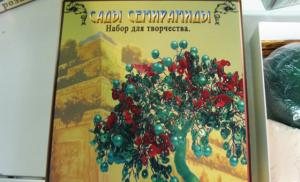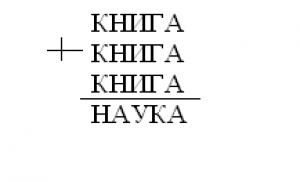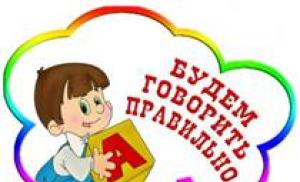What is the symbolic meaning of the drama of Ostrovsky's "thunderstorm". The meaning of the name and symbolism of the play "Thunderstorm
Where are you, thunderstorm - a symbol of freedom?
A. S. Pushkin
A play by A.N. Ostrovsky's "Thunderstorm" was written under the impression of the writer from a trip in 1856 along the Volga River. When the play was printed and staged in the theatre, contemporaries saw in it a call for the renewal of life, for freedom, because it was published in 1860, when everyone was waiting for the abolition of serfdom.
In the center of the play is a sharp conflict between the masters of life, representatives of the "dark kingdom", and their victims. Against the backdrop of a beautiful landscape, Ostrovsky draws the unbearable life of the common people. Ostrovsky often correlates the state of nature with the state of the soul of the characters. At the beginning of the play, nature is quiet, calm and serene, the life of the Kabanov merchant family seems the same to us. But gradually nature becomes different: clouds roll in, thunder is heard somewhere. A thunderstorm is coming, but is it only in nature? No. A storm is also expected in society, in this realm of despotism. What is a thunderstorm at Ostrovsky?
This name is ambiguous. The first to speak about the thunderstorm is the son of Kabanikha Tikhon: “There will be no thunderstorm over me for two weeks.” Tikhon is afraid and does not love his mother, he is also an unfortunate person. The storm is perceived by the heroes as a punishment, they are afraid of it and expect it at the same time, because then it will become easier. “The storm is sent to us as a punishment,” he teaches Wild Kuligina. The power of this fear extends to many heroes of the drama and does not even pass by Katerina.
The image of Katerina is the most striking image in Ostrovsky's play "Thunderstorm". ON THE. Dobrolyubov, analyzing in detail the image of Katerina, called her "a ray of light in a dark kingdom." Katerina is very sincere, real, freedom-loving. She believes in God, therefore she considers her love for Boris a sin. She sincerely thinks that she deserves punishment and should repent: “I didn’t know that you were so afraid of thunderstorms,” Varvara tells her. “How, girl, do not be afraid! Katherine answers. - Everyone should be afraid. It’s not that it’s scary that it will kill you, but that death will suddenly find you as you are, with all your sins.
If in nature a thunderstorm has already begun, then in life it is only approaching. Thunderstorm is a symbol of liberation from the "dark kingdom", which has already begun. Shatters the old foundations of the mind and common sense inventor Kuligin; Katerina protests, although unconsciously, she does not want to put up with such living conditions and decides her own fate. She rushes into the Volga in order to preserve the right to freedom in life and in love. So she wins a moral victory over the "dark kingdom". In all this lies the main meaning of a realistic symbol - the symbol of a thunderstorm.
However, it is not only positive. There is something spontaneous, natural in Katerina's love for Boris, just like in a thunderstorm. Love should bring joy, but this is not the case with Katerina, because she is married.
The storm also manifests itself in the very nature of the heroine - she is not subject to any conventions and restrictions. She herself says that even as a child, when someone offended her, she ran away from home and sailed away alone in a boat along the Volga. Dreamy, honest, sincere, kind Katerina takes the oppressive atmosphere of philistine society especially hard. Her act, like a thunderstorm, disturbed the peace of a provincial town, brought freedom and renewal of life.
Contemporaries saw in the play a protest against the oppression of the individual under the conditions of serfdom, for them the social implication was important. However, the meaning of the name is deeper. Ostrovsky protests against any insult to the individual, against the suppression of freedom.
The topical meaning of the drama is gone, but the play "Thunderstorm" has remained relevant in our days, because the image of Katerina, no doubt, evokes sympathy from readers and viewers.
What is symbolic meaning the title of the play "Thunderstorm".
The play "Thunderstorm" Ostrovsky wrote in 1859 at a time when a change in social foundations was ripe in Russia, on the eve of the peasant reform. Therefore, the play was perceived as an expression of spontaneous revolutionary sentiments. populace. It was not for nothing that Ostrovsky gave his play the name "Thunderstorm". The storm occurs not only as a natural phenomenon, the action unfolds to the sound of thunder, but also as an internal phenomenon - the characters are characterized through their attitude to a thunderstorm. For each hero, a thunderstorm is a special symbol, for some it is a harbinger of a storm, for others it is purification, the beginning of a new life, for others it is a "voice from above" that predicts some important events or warns against doing something.
In Katerina’s soul, an invisible thunderstorm is happening to no one, a thunderstorm for her is a punishment from heaven, “the hand of the Lord”, which should punish her for betraying her husband: “It’s not scary that it will kill you, but that death will suddenly catch you with all thoughts crafty". Katerina is afraid and waiting for a thunderstorm. She loves Boris, but this depresses her. She believes that she will burn in "fiery hell" for her sinful feelings.
For the mechanic Kuligin, a thunderstorm is a crude manifestation of natural forces, consonant with human ignorance, which must be fought. Kuligin believes that by introducing mechanization and enlightenment into life, one can achieve power over "thunder", which carries the meaning of rudeness, cruelty and immorality: "I decay in the dust with my body, I command the thunders with my mind." Kuligin dreams of building a lightning rod to save people from the fear of a thunderstorm.
For Tikhon, a thunderstorm is anger, oppression on the part of the mother. He is afraid of her, but as a son he must obey her. Leaving home on business, Tikhon says: "Yes, as far as I know, there will be no thunderstorm over me for two weeks, there are no shackles on my legs."
Dikoy believes that it is impossible and sinful to resist lightning. For him, a thunderstorm is humility. Despite his wild and vicious disposition, he dutifully obeys the Kabanikhe.
Boris fears human thunderstorms more than natural ones. Therefore, he leaves, throws Katerina alone with people's rumors. "It's scarier here!" - says Boris, running away from the place of prayer of the whole city.
The thunderstorm in Ostrovsky's play symbolizes both ignorance and malice, heavenly punishment and retribution, as well as purification, insight, the beginning of a new life. This is evidenced by the conversation of two townspeople of Kalinov, changes began to occur in the outlook of the inhabitants, the assessment of everything that was happening began to change. Perhaps people will have a desire to overcome their fear of a thunderstorm, to get rid of the oppression of anger and ignorance that reigns in the city. After the terrible peals of thunder and lightning strikes, the sun will shine again overhead.
N.A. Dobrolyubov in the article "A Ray of Light in the Dark Kingdom" interpreted the image of Katerina as "a spontaneous protest carried to the end", and suicide - as a force of a freedom-loving character: "such a liberation is bitter; but what to do when there is no other."
I believe that Ostrovsky's play "Thunderstorm" was timely and contributed to the fight against the oppressors.
1. The image of a thunderstorm. time in the play.
2. Dreams of Katerina and symbolic images end of the world.
3. Heroes-symbols: Wild and Boar.
The very title of A. N. Ostrovsky's play "Thunderstorm" is symbolic. A thunderstorm is not only an atmospheric phenomenon, it is an allegorical designation of the relationship between the elders and the younger, those who have power and those who are dependent. “... There will be no thunderstorm over me for two weeks, there are no shackles on my legs ...” - Tikhon Kabanov is glad to escape from the house at least for a while, where his mother “gives orders, one is more formidable than the other.”
The image of a thunderstorm - a threat - is closely related to the feeling of fear. “Well, what are you afraid of, pray tell! Now every grass, every flower rejoices, but we hide, we are afraid, just what kind of misfortune! The storm will kill! This is not a storm, but grace! Yes, grace! You all have a thunderstorm! - Kuligin shames fellow citizens, trembling at the sound of thunder. Indeed, a thunderstorm as a natural phenomenon is as necessary as sunny weather. Rain washes away dirt, cleanses the earth, promotes better plant growth. A person who sees in a thunderstorm a natural phenomenon in the cycle of life, and not a sign of divine wrath, does not feel fear. The attitude to the thunderstorm in a certain way characterizes the heroes of the play. The fatalistic superstition associated with a thunderstorm and widespread among the people is voiced by the tyrant Wild and a woman hiding from a thunderstorm: “A thunderstorm is sent to us as a punishment so that we feel ...”; "Yes, no matter how you hide! If someone's destiny is written, then you won't go anywhere. But in the perception of Diky, Kabanikh and many others, the fear of a thunderstorm is something familiar and not a very vivid experience. “That's it, you need to live in such a way as to always be ready for anything; there would be no such fear, ”Kabanikha remarks coolly. She has no doubt that the storm is a sign of God's wrath. But the heroine is so convinced that she leads correct image life that does not experience any anxiety.
Only Katerina experiences the liveliest thrill before a thunderstorm in the play. We can say that this fear clearly demonstrates her mental discord. On the one hand, Katerina longs to challenge the hateful existence, to meet her love. On the other hand, she is not able to renounce the ideas inspired by the environment in which she grew up and continues to live. Fear, according to Katerina, is an integral element of life, and it is not so much the fear of death as such, but the fear of the coming punishment, of one's spiritual failure: “Everyone should be afraid. It’s not that scary that it will kill you, but that death will suddenly find you as you are, with all your sins, with all your evil thoughts.
In the play, we also find another attitude to the storm, to the fear that it supposedly must evoke. “I’m not afraid,” say Varvara and the inventor Kuligin. The attitude to the thunderstorm also characterizes the interaction of one or another character in the play with time. Wild, Kabanikhs and those who share their view of the thunderstorm as a manifestation of heavenly displeasure, of course, are inextricably linked with the past. Internal conflict Katerina comes from the fact that she is unable to either break with ideas that are fading into the past, or keep the precepts of Domostroy in inviolable purity. Thus, she is at the point of the present, at a contradictory, critical time when a person must choose how to act. Varvara and Kuligin are looking to the future. In the fate of Varvara, this is emphasized by the fact that she leaves her native home to no one knows where, almost like heroes of folklore setting off in search of happiness, and Kuligin is constantly in scientific search.
The image of time now and then slips through the play. Time does not move uniformly: it either shrinks to a few moments, or it stretches for an incredibly long time. These transformations symbolize different sensations and changes, depending on the context. “For sure, I used to go into paradise, and I don’t see anyone, and I don’t remember the time, and I don’t hear when the service is over. Just like it all happened in one second” - this is how Katerina characterizes the special state of spiritual flight that she experienced in her childhood, attending church.
“The last times ... according to all signs, the last. You also have paradise and silence in your city, but in other cities it’s so simple sodom, mother: noise, running around, incessant driving! The people are just scurrying about, one there, the other here. The wanderer Feklusha interprets the acceleration of the pace of life as approaching the end of the world. Interestingly, the subjective sensation of time compression is experienced differently by Katerina and Feklusha. If for Katerina the quickly flying time of the church service is associated with a feeling of inexpressible happiness, then for Feklusha the “diminution” of time is an apocalyptic symbol: “... Time is getting shorter. It used to be that summer or winter dragged on and on, you can’t wait until they end, and now you don’t even see how they fly by. The days and hours seem to have remained the same; but time, for our sins, is getting shorter and shorter.
No less symbolic are the images from Katerina's childhood dreams and fantastic images in the stranger's story. Alien gardens and palaces, the singing of angelic voices, flying in a dream - all these are symbols pure soul still unaware of contradictions and doubts. But the unrestrained movement of time finds expression in Katerina's dreams: “I no longer dream, Varya, as before, paradise trees and mountains; but it’s as if someone is hugging me so hotly and hotly and leading me somewhere, and I follow him, I go ... ”. So Katerina's experiences are reflected in dreams. What she tries to suppress in herself rises from the depths of the unconscious.
The motifs of "vanity", "fiery serpent" that arise in Feklusha's story are not just the result of a fantastic perception of reality common man, ignorant and superstitious. The themes sounding in the wanderer's story are closely connected with both folklore and biblical motifs. If the fiery serpent is just a train, then the vanity in Feklusha's view is a capacious and ambiguous image. How often do people rush to do something, not always correctly assessing real value his deeds and aspirations: “It seems to him that he is running after business; he is in a hurry, the poor man, he does not recognize people, it seems to him that someone is beckoning him; but it will come to the place, but it is empty, there is nothing, there is only one dream.
But in the play "Thunderstorm" not only phenomena and concepts are symbolic. The figures of the characters in the play are also symbolic. In particular, this applies to the merchant Diky and Marfa Ignatievna Kabanova, nicknamed Kabanikha in the city. A symbolic nickname, and even the surname of the venerable Savel Prokofich can rightfully be called a speaker. This is not accidental, because it was in the images of these people that the storm was embodied, not the mystical heavenly wrath, but the very real tyrannical power, firmly entrenched on the sinful earth.
I used this technique in the comedy "Woe from Wit". The bottom line is that objects are endowed with a certain symbolic meaning. Images-symbols can be end-to-end, that is, repeated several times throughout the text. In this case, the meaning of the symbol becomes significant for the plot. Particular attention should be paid to those images-symbols that are included in the title of the work. That is why the emphasis should be placed on the meaning of the title and figurative symbolism of the drama The Thunderstorm.
To answer the question of what the symbolism of the title of the play "Thunderstorm" contains, it is important to know why and why the playwright used this particular image. Thunderstorm in the drama appears in several forms. The first is a natural phenomenon. Kalinov and its inhabitants seem to live in anticipation of thunder and rain. The events unfolding in the play take about 14 days. All this time from passers-by or from the main actors there are phrases that a thunderstorm is coming. The violence of the elements is the culmination of the play: it is the storm and the peals of thunder that make the heroine confess to treason.
Moreover, peals of thunder accompany almost the entire fourth act. With each beat, the sound grows louder: Ostrovsky seems to be preparing readers for the highest point of conflict.
The symbolism of a thunderstorm includes another meaning. "Thunderstorm" is understood different heroes differently. Kuligin is not afraid of a thunderstorm, because he does not see anything mystical in it. Wild considers a thunderstorm a punishment and an occasion to remember the existence of God. Katerina sees in a thunderstorm a symbol of fate and fate - after the most rolling thunderclap, the girl confesses her feelings for Boris. Katerina is afraid of thunderstorms, because for her it is equivalent to the Last Judgment. At the same time, the storm helps the girl to take a desperate step, after which she became honest with herself. For Kabanov, Katerina's husband, a thunderstorm has its own meaning. He talks about this at the beginning of the story: Tikhon needs to leave for a while, which means he needs to lose his mother's control and orders. “There will be no thunderstorm over me for two weeks, there are no shackles on my legs ...”. Tikhon compares the riot of nature with the incessant tantrums and whims of Marfa Ignatievna.
One of the main symbols in Ostrovsky's Thunderstorm can be called the Volga River. It seems to separate two worlds: the city of Kalinov, dark kingdom and the ideal world that each of the characters came up with. Indicative in this respect are the words of the Lady. Twice the woman said that the river is a whirlpool that draws in beauty. From a symbol of supposed freedom, the river turns into a symbol of death.
Katerina often compares herself to a bird. She dreams of flying away, escaping from this addictive space. “I say: why don’t people fly like birds? You know, sometimes I feel like I'm a bird. When you stand on a mountain, you are drawn to fly,” says Katya to Varvara.
Birds symbolize the freedom and lightness that a girl is deprived of.
The symbol of the court is not difficult to trace: it appears several times throughout the work. Kuligin, in conversations with Boris, mentions the court in the context of the "cruel morals of the city." The court appears to be a bureaucratic apparatus that is not called upon to seek the truth and punish violations. He can only take time and money. Feklusha talks about refereeing in other countries. From her point of view, only a Christian court and a court according to the laws of house building can judge righteously, while the rest are mired in sin.
Katerina, on the other hand, talks about the Almighty and about human judgment when she tells Boris about her feelings. For her, Christian laws come first, and not public opinion: “If I was not afraid of sin for you, will I be afraid of human judgment?”
On the walls of the dilapidated gallery, past which the inhabitants of Kalinovo walk, scenes from the Holy Letter are depicted. In particular, the paintings of fiery hell. Katerina herself recalls this mythical place. Hell becomes synonymous with mustiness and stagnation, which Katya is afraid of. She chooses death, knowing that this is one of the worst Christian sins. But at the same time, through death, the girl gains freedom.
The symbolism of the drama "Thunderstorm" is developed in detail and includes several images-symbols. Using this technique, the author wanted to convey the severity and depth of the conflict that was both in society and within each person. This information will be useful for 10 classes when writing an essay on the topic "The meaning of the name and symbolism of the play" Thunderstorm "".
The meaning of the name and symbolism of the play "Thunderstorm" by Ostrovsky - an essay on the topic |
The realistic method of writing enriched literature with symbolic images. Griboyedov used this technique in the comedy Woe from Wit. The bottom line is that objects are endowed with a certain symbolic meaning. Images-symbols can be end-to-end, that is, repeated several times throughout the text. In this case, the meaning of the symbol becomes significant for the plot. Particular attention should be paid to those images-symbols that are included in the title of the work. That is why it is necessary to focus on the meaning of the title and figurative symbolism of the drama "Thunderstorm".
To answer the question of what the symbolism of the title of the play "Thunderstorm" contains, it is important to know why and why the playwright used this particular image. Thunderstorm in the drama appears in several forms. The first is a natural phenomenon. Kalinov and its inhabitants seem to live in anticipation of thunder and rain. The events unfolding in the play take about 14 days. All this time, from passers-by or from the main characters there are phrases that a thunderstorm is coming. The violence of the elements is the culmination of the play: it is the storm and the peals of thunder that make the heroine confess to treason. Moreover, peals of thunder accompany almost the entire fourth act. With each beat, the sound grows louder: Ostrovsky seems to be preparing readers for the highest point of conflict.
The symbolism of a thunderstorm includes another meaning. "Thunderstorm" is understood by different heroes in different ways. Kuligin is not afraid of a thunderstorm, because he does not see anything mystical in it. Wild considers a thunderstorm a punishment and an occasion to remember the existence of God. Katerina sees in a thunderstorm a symbol of fate and fate - after the most rolling thunderclap, the girl confesses her feelings for Boris. Katerina is afraid of thunderstorms, because for her it is equivalent to the Last Judgment. At the same time, the storm helps the girl to take a desperate step, after which she became honest with herself. For Kabanov, Katerina's husband, a thunderstorm has its own meaning. He talks about this at the beginning of the story: Tikhon needs to leave for a while, which means he needs to lose his mother's control and orders. “There will be no thunderstorm over me for two weeks, there are no shackles on my legs ...”. Tikhon compares the riot of nature with the incessant tantrums and whims of Marfa Ignatievna.
One of the main symbols in Ostrovsky's Thunderstorm can be called the Volga River. She seems to separate two worlds: the city of Kalinov, the "dark kingdom" and that ideal world that each of the characters came up with for themselves. Indicative in this respect are the words of the Lady. Twice the woman said that the river is a whirlpool that draws in beauty. From a symbol of supposed freedom, the river turns into a symbol of death.
Katerina often compares herself to a bird. She dreams of flying away, escaping from this addictive space. “I say: why don’t people fly like birds? You know, sometimes I feel like I'm a bird. When you stand on a mountain, you are drawn to fly,” says Katya to Varvara. Birds symbolize the freedom and lightness that a girl is deprived of.
The symbol of the court is not difficult to trace: it appears several times throughout the work. Kuligin, in conversations with Boris, mentions the court in the context of the "cruel morals of the city." The court appears to be a bureaucratic apparatus that is not called upon to seek the truth and punish violations. He can only take time and money. Feklusha talks about refereeing in other countries. From her point of view, only a Christian court and a court according to the laws of house building can judge righteously, while the rest are mired in sin.
Katerina, on the other hand, talks about the Almighty and about human judgment when she tells Boris about her feelings. For her, Christian laws come first, and not public opinion: “If I was not afraid of sin for you, will I be afraid of human judgment?”
On the walls of the dilapidated gallery, past which the inhabitants of Kalinovo walk, scenes from the Holy Letter are depicted. In particular, the paintings of fiery hell. Katerina herself recalls this mythical place. Hell becomes synonymous with mustiness and stagnation, which Katya is afraid of. She chooses death, knowing that this is one of the worst Christian sins. But at the same time, through death, the girl gains freedom.
The symbolism of the drama "Thunderstorm" is developed in detail and includes several images-symbols. Using this technique, the author wanted to convey the severity and depth of the conflict that was both in society and within each person. This information will be useful for 10 classes when writing an essay on the topic "The meaning of the name and symbolism of the play" Thunderstorm "".
Artwork test













